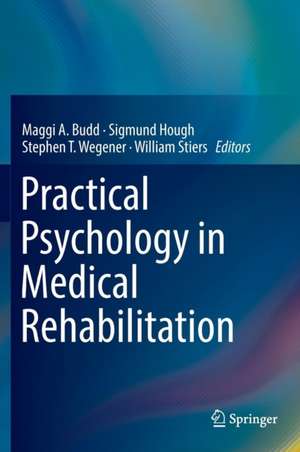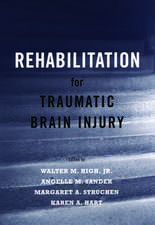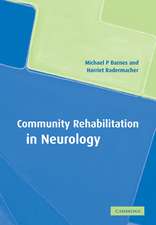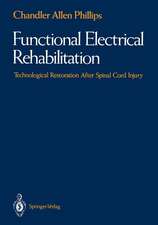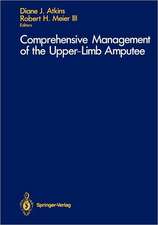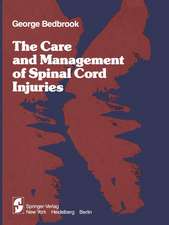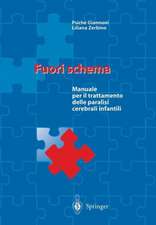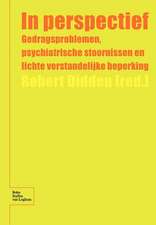Practical Psychology in Medical Rehabilitation
Editat de Maggi A. Budd, Sigmund Hough, Stephen T. Wegener, William Stiersen Limba Engleză Hardback – 16 noi 2016
Coverage spotlights these core areas:
·Basics and biopsychosocial practicalities, from behavioral medicine and psychopharmacology to ethical and forensic issues.
·Populations, problems, and procedures, including stroke, TBI, substance abuse, transplants, and severe mental illness.
·Assessment and practical interventions such as pain, anxiety, cognitive functioning, and more.
·Consultation, advocacy, and interdisciplinary teams.
·Practice management, administration, and professional self-care. ·Research, technology, and program evaluation.
Practical Psychology in Medical Rehabilitation is an essential professional development tool for novice (and a refresher for veteran) psychologists and neuropsychologists, as well as rehabilitation physicians, nurses, therapists, psychiatrists, and social workers. It presents in depth both the hallmarks of the specialty and the nuts and bolts of being a valuable team player in a medical setting.
| Toate formatele și edițiile | Preț | Express |
|---|---|---|
| Paperback (1) | 869.70 lei 3-5 săpt. | |
| Springer International Publishing – 24 aug 2017 | 869.70 lei 3-5 săpt. | |
| Hardback (1) | 1316.96 lei 6-8 săpt. | |
| Springer International Publishing – 16 noi 2016 | 1316.96 lei 6-8 săpt. |
Preț: 1316.96 lei
Preț vechi: 1386.27 lei
-5% Nou
Puncte Express: 1975
Preț estimativ în valută:
252.03€ • 273.67$ • 211.71£
252.03€ • 273.67$ • 211.71£
Carte tipărită la comandă
Livrare economică 23 aprilie-07 mai
Preluare comenzi: 021 569.72.76
Specificații
ISBN-13: 9783319340326
ISBN-10: 3319340328
Pagini: 898
Ilustrații: XXI, 529 p. 14 illus.
Dimensiuni: 178 x 254 x 33 mm
Greutate: 1.25 kg
Ediția:1st ed. 2017
Editura: Springer International Publishing
Colecția Springer
Locul publicării:Cham, Switzerland
ISBN-10: 3319340328
Pagini: 898
Ilustrații: XXI, 529 p. 14 illus.
Dimensiuni: 178 x 254 x 33 mm
Greutate: 1.25 kg
Ediția:1st ed. 2017
Editura: Springer International Publishing
Colecția Springer
Locul publicării:Cham, Switzerland
Cuprins
Basics and Biopsychosocial Practicalities.- Information gathering and documentation.- Language of rehabilitation.- Basic lab findings.- Neurology of neuropsychology.- Neurology.- Imaging basics.- Everyday psychopharmacology.- Practical ethics.- Models of adaptation and resilience.- Disability models.- Social participation and ability/disability.- Forensic issues: health care proxy, advance directives, and guardianship.- Populations, Problems, and Procedures.- Traumatic brain injury.- Stroke.- Neurological tumors.– Spinal cord injury.- Multiple sclerosis.- Sensory impairments.- Spine, back, and musculoskeletal disorders.- Amputation.- Total joint replacement.- Developmental similarities and differences: congenital and acquired disabilities.- Pediatric rehabilitation psychology.- Geriatric rehabilitation psychology.- Organ transplantation patients.- Intensive care patients.-Cardiovascular disease patients.- Pain.- Delirium.- Suicidality.- Substance abuse.- Severe mental illness.- Conversion disorder.- Treatment adherence to prevent secondary complications.- Sexual health.- Sleep issues.- Fatigue.-Obesity.- Burns.- Respiratory and pulmonary disorders.- Decision making capacity and competency.- Adaptive/assistive technology.- Incorporating accreditation standards.- Behavioral medicine: nutrition, medication management, exercise.- Biofeedback.- Group psychotherapy.- Assessment and Practical Intervention.- Neurological exam: mental status, cranial nerves, and motor systems.- Assessing acute mental status changes.- Differentiating dementias and delirium.- Depression and anxiety assessment.- Cognitive assessment.- Evaluating for opioid use.- Behavioral activation: smart goals.- Psychotherapy.- Interventions: family adaptation.- Coping effectiveness training.– Self-management.– Cognitive retraining and remediation.- Interventions to increase resilience and adaptation.- Managing challenging patients (countertransference, resistance, apathy, anger, etc.).- Vocation and recreation.- Consultation and Advocacy.- Models of consultation.- Interdisciplinary teams.- Practice Management and Administration.- CPT and billing codes.- Burnout prophylactics: professional self-care.- Research and Self Evaluation.- Research made useful for clinicians.- Using technology to practice evidence-based medicine.- Systematic program evaluation and improvement activities.
Notă biografică
Maggi A Budd, MPH, Ph.D, board certified in rehabilitation psychology, provides direct patient care for individuals with spinal cord injury and/or head injury at Boston VA Healthcare System. An instructor at Harvard Medical School, licensed in Massachusetts, Dr. Budd is director of the VA Boston Practicum Rehabilitation Psychology program and also actively serves on the Advisory Medical Bioethics Committee for VA Boston.
Sigmund Hough, Ph.D, ABPP-RP is assistant professor in the Department of Psychiatry, Harvard Medical School and adjunct assistant professor of psychiatry at Boston University School of Medicine. He is a Fellow in the National Academy of Neuropsychology, registered as a National Health Care Provider in Psychology, licensed in Massachusetts and Maine. Dr. Hough is an AASECT certified sex therapist and of the international journal Sexuality and Disability. William Stiers, Ph.D, ABPP-RP. Dr. Stiers is a licensed psychologist, board certified in re
habilitation psychology, and a faculty member at Johns Hopkins University School of Medicine, Department of Physical Medicine and Rehabilitation where he provides direct patient care for persons with brain injury and serves as the director of psychology training.Stephen T. Wegener, PhD ABPP (Rp) is Professor of Physical Medicine and Rehabilitation and Director of the Division of Rehabilitation and Neuropsychology at Johns Hopkins School of Medicine.Textul de pe ultima copertă
This easy-access guide summarizes the dynamic specialty of rehabilitation psychology, focusing on real-world practice in the medical setting. It begins by placing readers at the frontlines of practice with a solid foundation for gathering information and communicating effectively with patients, families, and staff. The book’s topics run a wide gamut of patient conditions (neurological, musculoskeletal, cardiovascular), related problems (sleep and fatigue issues, depression) and practitioner responses (encouraging coping and compliance, pediatric and geriatric considerations). Models of disability and adaptation, review of competency concerns, and guidelines for group and individual therapy offer evidence-based insights for helping patients manage their health conditions, benefit from rehabilitation interventions, and prepare for their post-rehabilitation lives and activities.
Coverage spotlights these core areas:
·Basics and biopsychosocial practicalities, from behavioral medicine and psychopharmacology to ethical and forensic issues.
·Populations, problems, and procedures, including stroke, TBI, substance abuse, transplants, and severe mental illness.
·Assessment and practical interventions such as pain, anxiety, cognitive functioning, and more.
·Consultation, advocacy, and interdisciplinary teams.
·Practice management, administration, and professional self-care. ·Research, technology, and program evaluation.
Practical Psychology in Medical Rehabilitation is an essential professional development tool for novice (and a refresher for veteran) psychologists and neuropsychologists, as well as rehabilitation physicians, nurses, therapists, psychiatrists, and social workers. It presents in depth both the hallmarks of the specialty and the nuts and bolts of being a valuable team player in a medical setting.
Coverage spotlights these core areas:
·Basics and biopsychosocial practicalities, from behavioral medicine and psychopharmacology to ethical and forensic issues.
·Populations, problems, and procedures, including stroke, TBI, substance abuse, transplants, and severe mental illness.
·Assessment and practical interventions such as pain, anxiety, cognitive functioning, and more.
·Consultation, advocacy, and interdisciplinary teams.
·Practice management, administration, and professional self-care. ·Research, technology, and program evaluation.
Practical Psychology in Medical Rehabilitation is an essential professional development tool for novice (and a refresher for veteran) psychologists and neuropsychologists, as well as rehabilitation physicians, nurses, therapists, psychiatrists, and social workers. It presents in depth both the hallmarks of the specialty and the nuts and bolts of being a valuable team player in a medical setting.
Caracteristici
Concise yet comprehensive and clinically oriented Useful for clinicians working in multiple settings: hospital, rehab, private office, on the go Includes appendix for further reading and resources Includes supplementary material: sn.pub/extras
